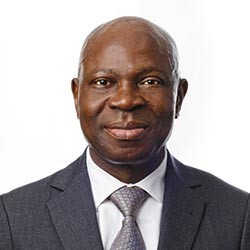Statement by Gilbert Houngbo, President of IFAD, on the occasion of the International Day of Persons with Disabilities 2021
IFAD Asset Request Portlet
Publicador de contenidos
Statement by Gilbert Houngbo, President of IFAD, on the occasion of the International Day of Persons with Disabilities 2021
03 diciembre 2021Today we celebrate the International Day of Persons with Disabilities. The theme for this year is “Leadership and participation of persons with disabilities toward an inclusive, accessible and sustainable post-COVID-19 world”.
One billion people, or 15% of the world’s population, experience some form of disability. Disability is more prevalent in the Global South, where persons with disabilities are more likely to have less education, poorer health outcomes, lower levels of employment, and higher poverty rates1.
And worldwide, persons with disabilities are often excluded from playing an active part and leadership roles in the political, economic and social life of their own countries and communities. They face multiple barriers, including societal stigma, discriminatory legal frameworks, inadequate infrastructure and tokenism. Barriers to participation and inclusion are highest among historically marginalized groups -for example, women with disabilities.
The ongoing pandemic is intensifying these inequalities and producing new threats. Persons with disabilities are disproportionately affected by the health, social and economic impacts of COVID-192. For example, when women and girls with disabilities were confined at home with their families and lost their usual systems of support, family tensions rose, leading to physical, sexual, emotional, and psychological violence against them3.
As recognised by the United Nations Disability Inclusion Strategy, persons with disabilities are actors of change, and possess unique knowledge and lived experience of disability. The human rights-based approach to disability inclusion affirms that persons with disabilities have the right to participate fully and effectively in decisions that affect their lives. Being able to do so is critical to the removal of systemic barriers to their full inclusion and participation in society.
What are we doing?
Various IFAD-supported projects are already working with persons with disabilities and their organisations. IFAD recognises that close consultation and active involvement with persons with disabilities at all stages – from planning and design to implementation and monitoring – is needed for IFAD to reach its programmatic and operational goals and leave no one behind.
IFAD is working closely with the International Disability Alliance to develop a corporate Disability Inclusion Strategy aimed at achieving equality of outcomes and fostering an inclusive culture in IFAD. The International Disability Alliance was also invited to join the consultations on the Twelfth Replenishment of IFAD's Resources.
Through the recently launched initiative “Sparking Disability Inclusive Rural Transformation”, or SPARK in short, and in partnership with Light for the World, the International Labour Organisation and PROCASUR Cooperation, we aim to learn how realise the rights of persons with disabilities and their organisations in IFAD-supported projects in different contexts. For example, disability inclusion facilitators are starting to work with project management teams in Burkina Faso, India, Malawi and Mozambique to support awareness and implementation of disability inclusion in their interventions. In addition, a helpdesk run by experienced disability inclusion advisors is being set up to respond to requests for support from the projects.
Fairness, inclusion and human dignity lie at the heart of the United Nations’ mandate. And ensuring leadership and participation of persons with disabilities is key to sustainable development. IFAD is committed to working with our partners toward an inclusive, accessible and sustainable post-COVID-19 world.
1 United Nations. Disability and Development Report Realizing the Sustainable Development Goals by, for and with persons with disabilities 2018
2 United Nations. Policy Brief on Persons with Disabilities and COVID-19 2020.
3 UNFPA & WEI. The Impact of COVID-19 on Women and Girls with Disabilities. A Global Assessment and Case Studies on Sexual and Reproductive Health and Rights, Gender-Based Violence, and Related Rights 2020
